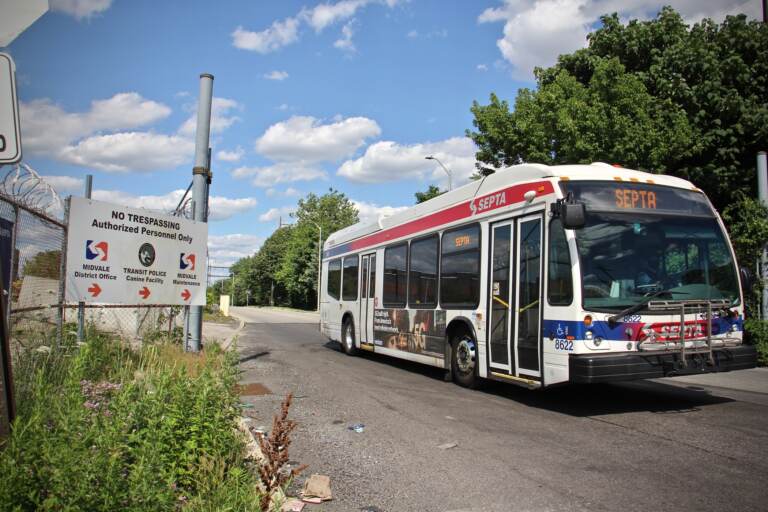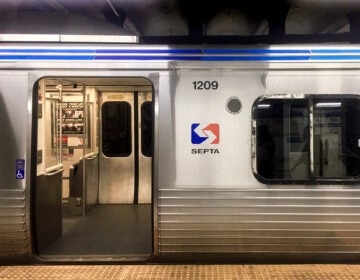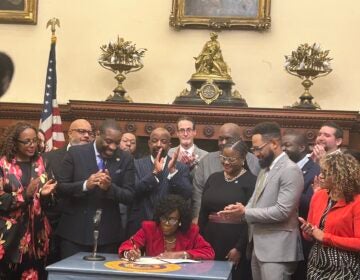SEPTA workers say the pandemic revealed labor issues that go beyond paychecks
The pandemic has reshaped workers’ conception of fairness at work. For SEPTA, upcoming union negotiations will reveal just how much has changed.

A bus leaves the Midvale depot in Nicetown. (Emma Lee/WHYY)
Ask us about COVID-19: What questions do you have about the coronavirus and vaccines?
Transportation Workers Union Local 234 president Willie Brown has two words for SEPTA: “Life Happens.”
As the union leader prepares to negotiate a new contract for more than 5,000 transit workers employed by the authority, Brown said he is prioritizing issues that haven’t historically been front and center at the bargaining table. Those things include better paid leave policies for parents, death compensation for the families of workers who died from COVID-19, and hazard pay, in addition to the standard ask of increased wages.
“[The pandemic] actually shined light on a lot of things,” said Brown, whose union represents more SEPTA workers than any other. “Even though everything has an economic background to it, [there’s] things that’s more important than just raises.”
The authority has received close to $1.5 billion in COVID-19 relief funds to keep the system running through the pandemic. SEPTA officials have said most of the money has gone toward labor costs. Andrew Busch, a SEPTA spokesperson, said the funds have to last the agency, which runs on a $1.5 billion operating budget, until 2024. Ridership, though increasing as people return to offices and classrooms, remains far from pre-pandemic levels at less than 50%.
Yet union officials point to other transit agencies who have managed to extend new benefits even as ridership dropped and balance sheets suffered. For example, the Metropolitan Transportation Authority in New York City paid out $500,000 in death benefits to the families of the more than 150 workers who died from the coronavirus despite the economic pressures facing the agency. Meanwhile, SEPTA denied such compensation to the 11 transit workers who died of coronavirus-related causes, citing financial concerns.
“We have people dying,” Brown said. “We have probably close to a thousand people who tested positive and we’re still testing positive for this virus, and all you get from SEPTA is a fruit basket?”
As the two sides prepare to battle it out over their interests, the threat of a strike looms. The union has struck 12 times since 1975.
Union officials say they are not there yet. But that doesn’t mean they won’t be, said Brian Pollitt, TWU Local 234 vice president.
“I’ve been in every round of negotiations for probably the last 20 years,” Pollitt said in a video. “And this, by far, is going to be the hardest based off of where we are in the world today.”
Stuart Davidson, a partner at Willig, Williams and Davidson, a law firm that specializes in labor law, said negotiations across the country have been impacted by the pandemic, which “is not going anywhere anytime soon.”
Issues such as hazard pay, sick leave, death benefits, better wages, and vaccines are bound to make their way to bargaining tables nationwide, said Davidson, and the nationwide worker shortage has given employees more leverage.
“Workplaces are dramatically more dangerous,” said Davidson. “And it’s not just the impact on a worker, but a worker has the potential and has to worry about bringing the virus home to his family or her family.”
SEPTA’s contract with TWU Local 234 expires Oct. 31.

Get daily updates from WHYY News!
WHYY is your source for fact-based, in-depth journalism and information. As a nonprofit organization, we rely on financial support from readers like you. Please give today.






![CoronavirusPandemic_1024x512[1]](https://whyy.org/wp-content/uploads/2020/03/CoronavirusPandemic_1024x5121-300x150.jpg)



